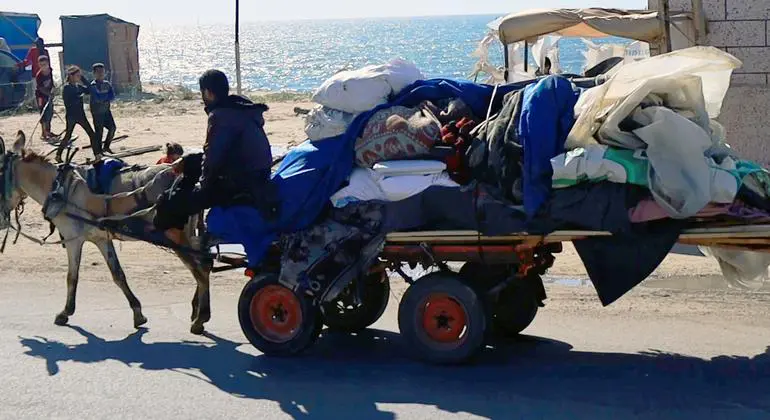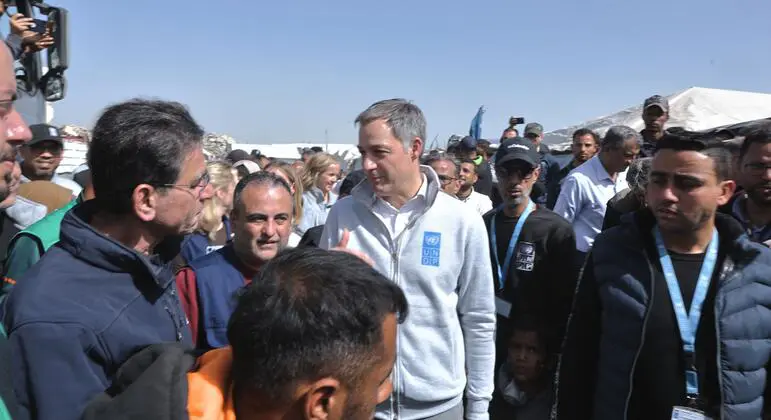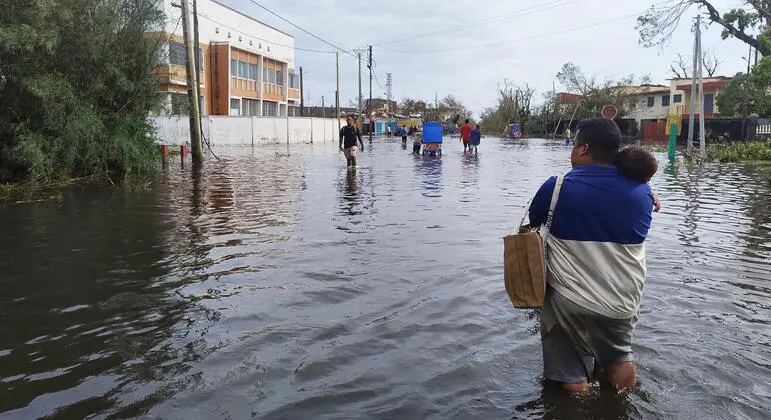Most of those uprooted by Israeli military evacuation orders in eastern Rafah have already been displaced from other areas of Gaza; they are now leaving with everything they can carry “in vehicles, trucks, (on) motorbikes and donkey carts”, according to the UN agency for Palestinian refugees (UNRWA).
More than 47,500 people are estimated to have left their shelters in Rafah on Wednesday alone, UNRWA said, with some families approaching the agency’s shelters at Tel Sultan as well as Al Mawasi in the west.
The World Food Programme’s (WFP) Director for Palestine Matthew Hollingworth said in a post on X on Thursday that the agency’s main warehouse “is now inaccessible.”
“No aid has entered from southern crossings in two days“, he added. There is only a single bakery still operational while supplies of food will last only one to three days.
Bombs all around
In an update, UNRWA noted “an ongoing and significant amount of bombardment” in eastern Rafah early Thursday “and all through the night”.
The development comes as UN humanitarians repeated warnings about the lack of desperately needed aid reaching highly vulnerable people in Gaza despite reports that the Kerem Shalom crossing near Rafah had reopened.
“We are engaging with all involved on the resumption of the entry of goods, including fuel, and so that we can again begin managing incoming supplies,” said the UN aid coordination office, OCHA late Wednesday. “However, the situation remains extremely fluid, and we continue to confront a range of challenges amid active hostilities. We count on cooperation and facilitation to get these crossings operational again since stocks of critical supplies, including fuel, are being depleted by the hour.”
The Kerem Shalom crossing had been closed following a deadly rocket attack claimed by Hamas last weekend. It is next to Rafah, which is the main entry point for aid into Gaza and which was seized on Tuesday by Israeli forces, dashing ceasefire hopes.
Northern aid delays
According to OCHA, more than a quarter of humanitarian missions to northern Gaza in April “were impeded by Israeli authorities, and 10 percent were denied…The UN and humanitarian partners continue efforts to scale up aid operations whenever and wherever possible.”
On Wednesday the UN World Food Programme (WFP) reported that it had reached Beit Hanoun, in northern Gaza, “which had been inaccessible for months”.
In a message on X, the agency said that it was ready to scale up food assistance across northern Gaza, “but rolling back six months months of starvation requires steady flows of food supplies. Safe, lasting access needs to be sustained over time.”
Lost time is lost lives: UNICEF chief
In a later statement, the UNICEF chief Catherine Russell, said fuel was urgently needed “to move lifesaving supplies – medicine, treatments for malnutrition, tents and water pipes – as well as staff to reach children and families in need.”
Supplies have been in effect severed she added, threatening to grind all operations to a halt.
“The limited essential infrastructure in Gaza that remains at least partially functional also depends on fuel to provide lifesaving services. This includes the remaining hospitals and primary healthcare centres, water desalination plants and water wells, sewage pumps and solid waste collection – all of which could run out of fuel within days, if not hours.”
“The situation is dire” she warned and if the Kerem Shalom and Rafah crossings are not reopened “the consequences will be felt almost immediately: life support services for premature babies will lose power; children and families will become dehydrated or consume dangerous water; sewage will overflow and spread disease further. Simply put, lost time will soon become lost lives.”
West Bank violence unabated
As war continues in Gaza, the UN rights office, OHCHR, warned that violations against Palestinians in the occupied West Bank have also increased substantially.
“The Israel Defense Forces (IDF) is acting as if there is an armed conflict in the West Bank,” said Ajith Sunghay, head of the OHCHR office in the Occupied Palestinian Territory, in an interview with UN News.
Mr. Sunghay explained that the situation in the West Bank was already very dire even before hostilities erupted in Gaza following the Hamas-led attacks in southern Israel that left some 1,250 dead and more than 250 taken hostage.
In its latest update on the situation in the West Bank, the UN aid office, OCHA, noted that the Israeli Supreme Court had ruled in favour of the return of 360 Palestinians to their homes in Khirbet Zanouta herding community in Hebron, six months after being displaced by settler attacks.







